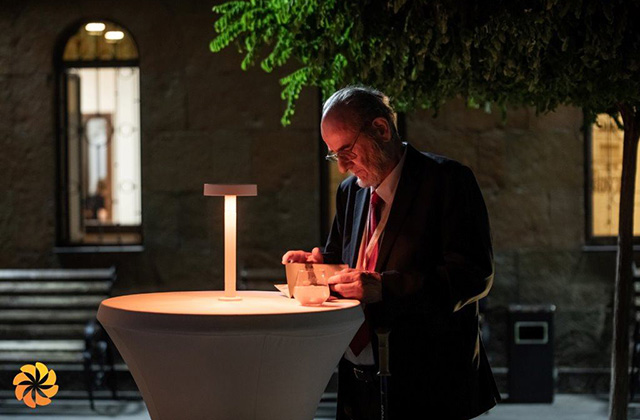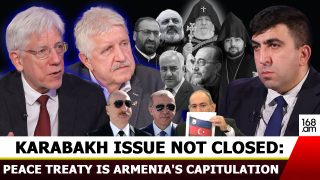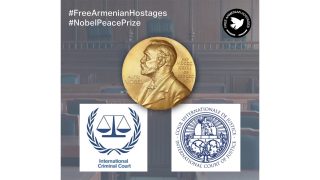
Books and A Poem on Karabakh

Over the past few weeks, a number of colleagues and friends have asked me about the conflict in Nagorno-Karabakh. Like them, I have agonized and searched for an answer to the decades-long conflict. I think academics and journalists have a responsibility to educate and provide greater depth. It is our only hope if we are to achieve meaningful dialogue and eventual peace. A number of authors have written about the topic. Here is a significant sampling of books in English and French:
Ara Aharonian, The Republic of Mountainous Karabakh (2011), Haig Asenbauer, On the Right of Self-Determination of the Armenian People of Nagorno-Karabagh (1996), Armen Baghdoyan, Armenia and Nagorno Karabakh: Problems of Security and Development (1998), Stephen Brook, Claws of the Crab: Georgia and Armenia in Crisis (1992), Vicken Cheterian, War and Peace in the Caucasus: Russia’s Troubled Frontier ( 2008), Levon Chorbajian and colleagues, The Caucasian Knot: The History & Geopolitics of Nagorno-Karabagh (1994), Leonidas Chrysanthopoulos, Caucasus Chronicles: Nation-Building and Diplomacy in Armenia, 1993-1994 (2002), Michael Croissant, The Armenia-Azerbaijan Conflict: Causes and Implications (1998), Hayk Demoyan, Western Media Coverage of the Nagorno-Karabakh Conflict in 1988-2000 (2008), Larisa Deriglazova and Sergey Minasyan, Nagorno-Karabakh: The Paradoxes of Strength and Weakness in an Asymetric Conflict (2011), Thomas de Waal, Black Garden: Armenia and Azerbaijan Through Peace and War (2004), Thomas de Waal, The Caucasus: An Introduction (2010), Patrick Donabedian and Claude Mutafian, Artsakh: Histoire du Karabagh (1991), Patrick Gore, ‘Tis Some Poor Fellows Skull: Post-Soviet Warfare in the Southern Caucasus (2008), Tatul Hakobyan, Karabakh Diary: Green and Black: Neither War Nor Peace (2010), Edmund Herzig, The New Caucasus: Armenia, Azerbaijan and Georgia (1999), Nikolay Hovhannisyan, The Karabakh Problem: The Thorny Road to Freedom and Independence (2004), Esmira Jafarova, Conflict Resolution in South Caucasus: Challenge to International Efforts (2015), Fred Labarre and George Niculescu, eds. Concrete Steps to Break the Deadlock in the South Caucasus (2020), Gerard Libaridian, The Karabagh File: Documents and Facts on the Question of Mountainous Karabagh, 1918-1988 (1988), Gerard Libaridian, Armenia at the Crossroads: Democracy and Nationhood in the Post-Soviet Era (1991), Mark Malkasian, ‘Gha-ra-bagh!” The Emergence of the National Democratic Movement in Armenia (1996), Gaidz Minassian, Caucase du Sud, la nouvelle guerre froide: Armenie, Azerbaijan, Georgie (2007), Sergey Minasyan, Nagorno-Karabakh After Two Decades of Conflict: Is Prolongation of the Status Quo Inevitable? (2010), Elkhan Nuriyev, The South Caucasus at the Crossroads: Conflicts, Caspian Oil and Great Power Politics (2007), Anna Ohanyan, ed. Networked Regionalism as Conflict Management (2015), Anna Ohanyan, ed. Russia Abroad: Driving Regional Fracture in Post-Communist Eurasia and Beyond (2018), Mikko Palonkorpi, The South Caucasus beyond Borders, Boundaries and Division Lines: Coflicts, Cooperation and Development (2015), Johannes Rau, The Nagorno-Karabakh Conflict between Armenia and Azerbaijan (2008), Farid Shafiyev, Resettling the Borderlands: State Relocations and Ethnic Conflict in the South Caucasus (2018), Scott Taylor, Unreconciled Differences: Turkey, Armenia and Azerbaijan (2010), Levon Ter-Petrossian, Armenian’s Future, Relations with Turkey and the Karabagh Conflict (2018), Christopher Walker, ed. Armenia and Karabagh: The Struggle for Unity (1991), Christoph Zurcher, The Post-Soviet Wars: Rebellion, Ethnic Conflict, and Nationhood in the Caucasus (2007).
The long list constitute a towering pile of books on my table and led me to pen the following poem:
Trying to Climb the Mountains
Terrible military clashes unfolding
in the rugged Caucasus Mountains.
The blood of different ethnic peoples
flow in increasing amounts,
merging into one turbulent, swiftly moving river.
Increasingly too much is destroyed in its path.
So many persons are looking for guidance and insight.
Our dining room table has a stack of books piled up on Karabakh.
It is a mountain of sorts.
Sometimes I feel like a novice PhD student all over again.
I am searching for an illusive path over the mountains.
I really wish I had a better guide book
or someone who knew the way.
So we open the page and take our first step…
Alan Whitehorn is an Armenian-Canadian poet and professor emeritus of political science.























